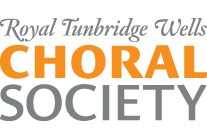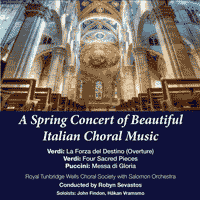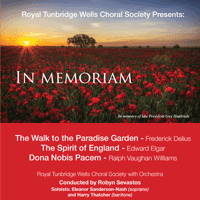115th Season: Programmes and Reviews (2018-2019)
Spring Concert 14th April in the Assembly Hall
Verdi: Overture to La forza del destino – The force of destiny
Verdi: Quattro pezzi sacri – Four sacred pieces
Puccini: Messa di gloria.
Critique of the RTWCS Spring Concert of beautiful Italian choral music, 14th April 2019
A good-sized audience was present for the Royal Tunbridge Wells Choral Society’s 115th year Spring Concert, a diverse collection of music by two celebrated Italian Romantic composers, conducted by Robyn Sevastos.
The afternoon commenced with Giuseppe Verdi’s overture to his opera “La Forza del Destino”, clearly and beautifully executed by the London based Salomon Orchestra, making a welcome return to Tunbridge Wells. Verdi’s rich Romantic harmonies flowed in this orchestral medley of operatic arias, rising and falling (with occasional solo flute) and almost teasing the listener’s ear before coming to a final rest.
This was followed by “Quattro Pezzi Sacri” (Four Sacred Pieces), composed near the end of Verdi’s life. The choir started the first “Ave Maria” movement with gentle unaccompanied homophonic singing; vocal parts were well balanced throughout, and the singers did their best to cope with the somewhat unusual harmonies. A strong violin entry led the chorus into the more dramatic “Stabat Mater” where contrasts of dynamics were evident; the a capella section “Quis est homo” was handled with clarity although intonation needed attention here. The female chorus “Laudi alla Vergine Maria” – prudently accompanied by piano instead of being sung unaccompanied – brought a sense of Renaissance feel with its un-earthly style, before the final contrasting operatic/plainsong section of the “Te Deum”. Here, the performance was moving, although there were times when more emotional singing would have added to the effect – everything was almost too controlled and needed to throw caution to the wind!
This particular work came across as rather too ambitious for the choral society and, despite best intentions, never really fulfilled its potential.
The choir was most fortunate to have two outstanding soloists performing this afternoon: John Findon (tenor) and Hakan Vramsmo (baritone), who treated everybody to a wonderful and excellently balanced duet from “La Forza del Destino” before the interval.
In the second half of the concert, the audience was presented with Giacomo Puccini’s “Messa di Gloria”, composed when the composer was 18. This suited the choral society well and was performed eloquently and sensitively. Some beautifully shaped phrasing was evident throughout with variation of contrasting dynamics. The fugal ending of the “Gloria” was movingly executed, and it was good to hear effective use of dotted rhythms in the “Credo” sections as well as some lovely inner harmonies from the altos and tenors in “Sanctus”. John Findon’s tenor rang out clearly and resonantly in “Gratias Agimus Tibi” and he employed a full range of dynamics to complement his operatic voice, while Hakan Vramsmo used his warm liquid baritone to full effect in “Crucifixus”, daring to use as quiet a dynamic as possible at the end, with full control. The concert was brought to a gentle and successful close with tenor/bass duet interspersed with chorus.
Robyn Sevastos has proved herself to be a popular and highly respected conductor and it is easy to see why. She conducted with great authority and control over all sections of both choir and orchestra. Special mention must also go to the leader of the orchestra Nick Hardistry and choir rehearsal accompanist Craig Hudson.
Michele Roszak
Autumn Concert (Remembrance Sunday) 11th November 2018 in the Assembly Hall
Delius: The walk to the Paradise Garden
Elgar: The spirit of England
Vaughan Williams: Dona nobis pacem
Critique of the Royal Tunbridge Wells Choral Society’s “In Memoriam concert, Sunday 11th November 2018
The Royal Tunbridge Wells Society’s choice of three English country pieces was entirely appropriate for the Armistice Centenary and a fitting memorial to the society’s late president, Guy Huntrods (a veteran of the Second World War).
Robyn Sevastos, making a very welcome debut with RTWCS, sensitively conducted the orchestra in Fredrik Delius “The Walk to the Paradise Garden” from the opera “A Village Romeo and Juliet”. This gentle piece was played with clarity; the heartrending and expressive Romantic harmonies most descriptive of the doomed young lovers. “The Spirit of England” by Edward Elgar was written to the war poet Laurence Binyon’s poetry and exposes the suffering caused by the First World War. The chorus started with a confident sound, ably assisted by soloist Eleanor Sanderson-Nash whose clear soprano voice floated effortlessly over choir and orchestra, with precise articulation. The cantata was performed in true Elgar style, with dramatic graduations of tone, although there were occasions when the orchestra overpowered the choir and some diction was lost. The second movement’s subtle use of minor keys and slower tempi was beautifully portrayed by both choir and soprano, expressing the despair and helplessness of the women left behind. There was much warmth in the choral tone and an emotive entry by the soprano soloist in “For the Fallen”, followed by a well-executed rhythmic march section leading to a wonderful diminuendo “We will remember them”. The finale revealed some fine choral singing.
After the interval, the audience was presented with the cantata “Dona Nobis Pacem” so evocative of Ralph Vaughan Williams’ modal style. A gentle start with a wonderfully clear soprano solo entry was followed by a powerfully rhythmic section of choir and orchestra together in which the racing triplets were handled with apparent ease. “In Reconciliation” introduced the warm, expressive baritone voice of Adam Maxey, accompanied with sensitivity by the choir. “The Dirge for Two Veterans” fully stretched the use of vocal and orchestral dynamics, and the choir dealt with modulations with ease and accuracy. There were some beautiful nuances of tone, combined with a sense of desperation in the tutti movements, clearly painting the vivid battle scenes. A calm and controlled softly sung finale expressed hope and optimism for the future.
Conductor Robyn Sevastos took full control of both choir and orchestra, drawing out the musical emotions but never allowing them to become self-indulgent. Excellent tuning was evident throughout. This was another very moving concert in keeping with the choral society’s usual high standard of performance. Congratulations must also go to rehearsal accompanist Craig Hudson and the RTWCS orchestra leader Bernard Brooks. A most enjoyable concert.
Michele Roszak
11th November 2018


